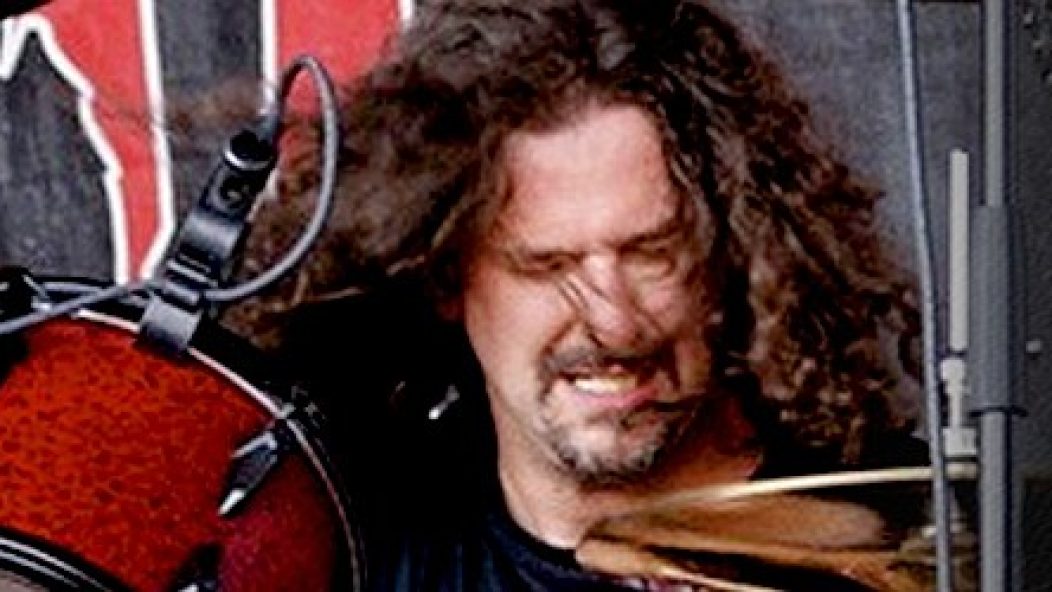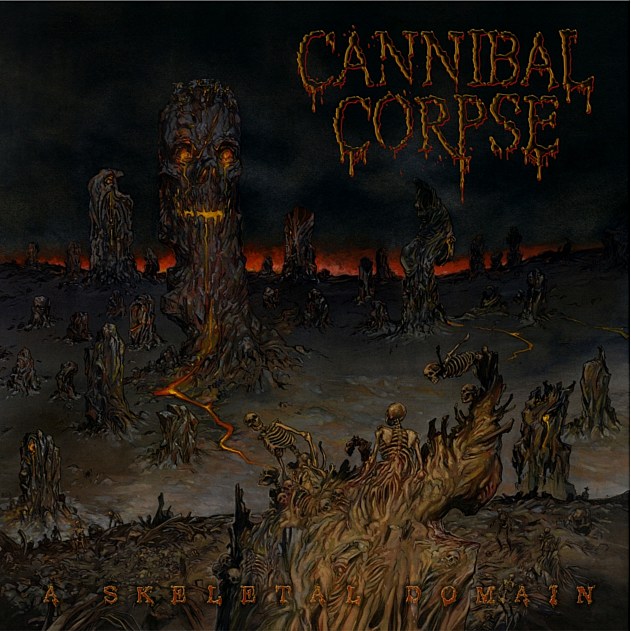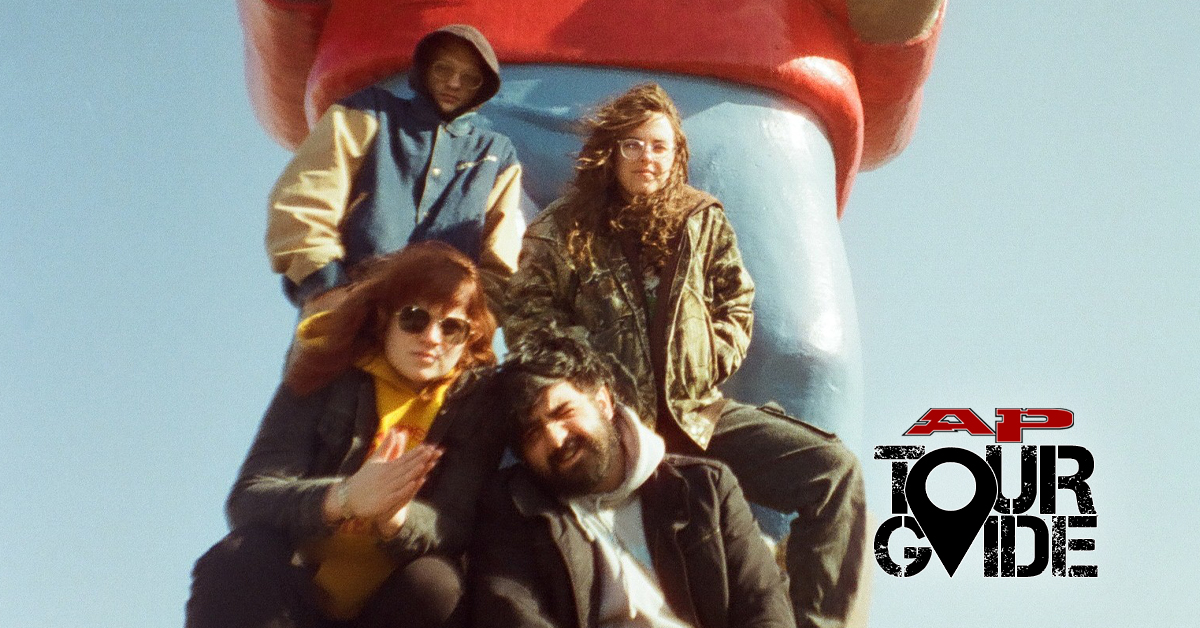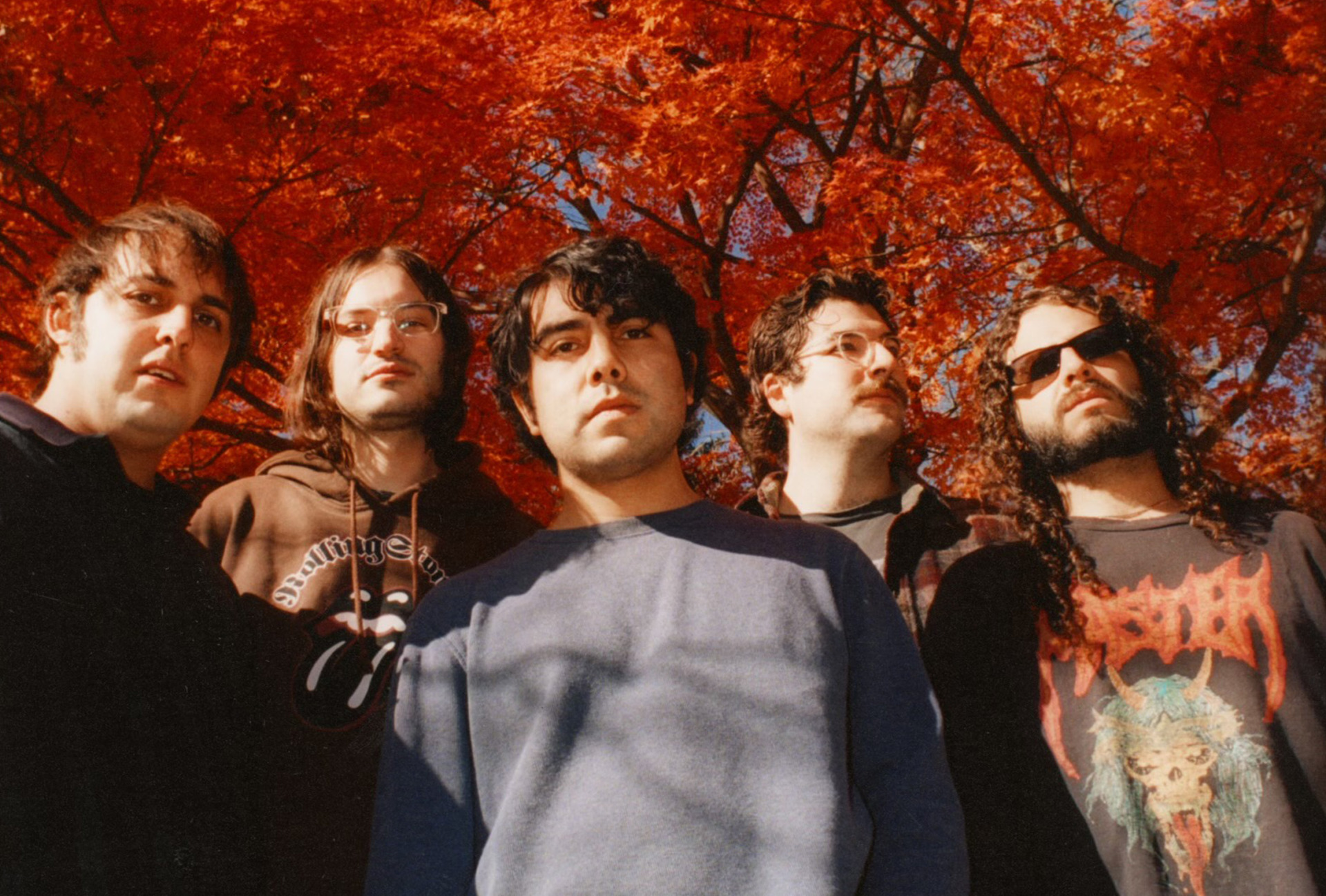
Aspects of Horror: Talking to Paul Mazurkiewicz of Cannibal Corpse

…
True to their namesake, Cannibal Corpse will not fucking die. The Florida-based five piece has been at the forefront of death metal since their formation in 1988. For the past two-and-a-half decades, the band has changed aspects of their sound and songwriting while maintaining a diehard obsession with monolithic death metal and unspeakable horror. Their upcoming album, A Skeletal Domain, is lucky number 13, and while the record sees the band members taking a momentary break from their oft-regarded blood-drenched gore imagery, the music thereon is still punishing, macabre, and most of all interesting. In that respect, Cannibal Corpse are what so many metal outfits dream of being: a functioning creative force, focused as much on creating new art as they are on their own storied legacy.
Drummer Paul Mazurkiewicz is a laid-back and thoughtful guy on the phone. While happy to discuss past album covers and production values, he sounds most excited when talking about the new record and the band’s new experiences.
…
A Skeletal Domain is Cannibal Corpse’s 13th album. Given that your band is so steeped in horror, is there any superstition or triskaidekaphobia dogging you?
Nah, man. I think we have our best album going on right now. 13 is going to be a good number for us.
After recording three albums with Hate Eternal’s Erik Rutan behind the board, you guys chose Mark Lewis to produce this album. What sparked the change?
It was really just time to try something different. We did three great albums with Erik, and he’s an amazing producer and a great friend of ours. Torture was an incredible-sounding record. It was just time to move on, get that breath of fresh air. Make headway, do something different. Keep it exciting, keep it new. The fact that Mark was local helped in that he was close to home in a way. And we saved a little money as well. Audiohammer is a no frills kind of situation. So we were able to actually have a little more time to work.
What would you say differentiates the new album’s production from that of Torture?
I think this one overall had a little more clarity, maybe, where every instrument sits a little more properly. But I haven’t done the test. I’ve been listening to the new record and I’ve been waiting to hear that thing that sounds off to me, but I don’t.
Do you ever do that with the old records—sit down and pick them apart?
It’s kind of all in the past. Sure, you can go back and do that, but it’s kind of pointless. Better leave it as is.
That’s interesting, because while a lot of bands rest on their laurels, Cannibal Corpse has always been about the new record. You’re very forward-thinking.
That’s what we try to do. And I think it’s apparent in the songs and our passion for it. We want to move forward. And we’re very fortunate that we’re able to do that. I think we’re a better band than we’ve ever been before, and that’s a culmination of everything we’ve done in the past. We’re coming into our own, which is pretty cool 25 years into it.
Something I love about Cannibal Corpse is the mix of those blinding fast tracks and those menacing slow tracks, like “A Skeletal Domain” or “Scourge Of Iron.” As the drummer, which are more fun to record, the slow or fast songs?
That’s tough. It depends on the songs, really. But I feel overall, naturally, I’m more used to playing fast. My body’s just accustomed to that. We didn’t start playing slow, and we never really played slow until songs like “From Skin To Liquid” or “Sentenced To Burn.” It’s good to have a mix of everything, but for me, playing slower is a little more unnatural. [Death metal] was just so ferocious and speed-oriented for years.
…
…
I’m not sure how involved everyone in the band is when it comes to themes and lyrics, but A Skeletal Domain isn’t as gory as previous Cannibal Corpse album titles. There’s something about a skeleton and skeletal imagery that’s more dry and creepy and kind of symbolic. Was that an intentional move, or just a mood that took the band?
It was what we’d been feeling at the time. We’d just come off a few really brutal album titles—Kill, Evisceration Plague, Torture. This one felt a little bit different. We wanted it to have more of that eeriness, that dark sinister vibe, not having to be that in-your-face blood-and-guts thing. We thought the song was such a great song to have as a title track. So I wrote the story behind that track, and we got a really creepy, dark piece of art to go with it. This time, we didn’t want the blood and guts. We’ve done that plenty and I’m sure we’ll do it again in the future.
I remember growing up buying Cannibal Corpse albums or merch, as much as I loved that in-your-face imagery, I also loved that censored artwork. Like the doll-faced horror on the pile of bones for Bloodthirst, and that looming outside shot of the cathedral from Gallery of Suicide.
That’s totally what we were going for. And I understand what you’re saying about those censored covers. Those are some of our favorites, especially Gallery of Suicide. It’s like, yes, it’s the outside of the Gallery, but really it’s a factory. It’s a killer cover for it being what it is—you’re looking at a building, you know—and it really works. Everything Vince [Locke, longtime Cannibal Corpse cover artist] does is always great. And that was what we went for here. We’re about horror in general, and many aspects of horror, and this is one of them.
You guys just did Mayhem Fest with a lot of mainstream bands like Korn and Avenged Sevenfold. I imagine a tour like that can be a little exhausting.
Yeah, but it was a good tour, though! It’s a long summer tour in the states, and it’s hot and all that, but the good thing about it for us is that it was a little flip-flopped from the normal headlining gig. Normally we go on at nine, 10 o’clock, and you’re playing for an hour and twenty minutes, as opposed to Mayhem where we’re playing at 5:45 every night for 35 minutes. So there’s the fact that we were only playing eight songs a night on Mayhem. That’s less than half of the average set. Normally, we’re playing 20 songs at a headlining gig. But I think with eight songs we could get some good ones in there and hit ‘em hard, hit ‘em good. I think it was a success.
Another big show you guys played was The Gathering of the Juggalos. It’s weird—that’s a very different crowd for you, but at the same time it totally feels like a crowd that could appreciate Cannibal Corpse. What was that fest like?
Oh man, it was amazing. It was very weird at first. When we got the offer, some of us didn’t even know what it was. I’d heard of it, but I didn’t understand it fully. But it was just perfect timing because it was an off-date for Mayhem. We would’ve just played a club show otherwise, but we got this offer for that, and it was a substantial offer. They’d been wanting us. They always have metal bands in some way, and they request certain bands, and they were excited to have us. And it was killer. We were the only band playing that day, which was weird for us. Normally at a festival, you’re dealing with deadlines and sound risers, but all the dudes before us were DJs with turntables and microphones. We sound-checked in the morning and left our stuff up there all day. It was a great show. The fans appreciated us. Yes, it’s more of a rap festival, but it’s an extreme rap festival so it all ties in.
You know, I feel like rap fans like Cannibal Corpse. They’re a metal band that hip-hop dudes respect. Why is that, do you think?
I think it’s the subject matter we sing about, and that we’ve done it our way. I mean, what’s so commercial about us? What has lasted us into our 40s? We’re Cannibal Corpse, we’ve been around 25 years. It’s just us being us. Being death metal.
…
…











